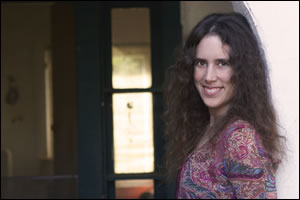Paul De Angelis: Dear Mrs. Kennedy, The World Shares Its Grief, Letters November 1963
September 23, 2010 by David
Filed under Non-Fiction, WritersCast
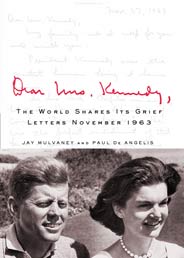 978-0312386153 – St. Martin’s Press – Hardcover – $19.99 (also available as an e-book at $9.99)
978-0312386153 – St. Martin’s Press – Hardcover – $19.99 (also available as an e-book at $9.99)
Are there more books about the Kennedys than about the Lincolns? I don’t know, but I am certain that there are many of them and my guess is that many who lived through the Kennedy era and many who did not, may feel they know everything they need to know about the Kennedys, JFK and Jackie, and the rest of the family. Reading this book may well change their minds.
In fact it’s a wonderful window into the heart and soul of America and in fact the world in the period just after the assassination of JFK in Dallas in November, 1963. Now almost a half century beyond that time, these letters, written by the famous and the ordinary, old and young, depict a period of extreme pain, emotional and social disruption, grief, sorrow, and disbelief that affected an incredible number of people all over the world. It gives us an opportunity to understand a great deal about how human beings respond to a devastating public tragedy. And some of the letters are simply beautiful, and transcendent in their expression of sympathy and emotion.
The story of the letters themselves is amazing – over 1 million condolence letters, notes and cards were sent to Jacqueline Kennedy in the months after the death of JFK. They were filed away and saved for many years, and despite a controversial culling in the 1980’s, there are still almost 400,000 letters, now cataloged and available for historians and journalists and the public to read and review. Editors Jay Mulvaney (who sadly passed away while working on this book) and subsequently Paul De Angelis, have given us a wonderful narrative and selection of letters that uses the words of the original writers to bring this terrible period in our history to life in an unusual and compelling tapestry of voices.
Paul De Angelis is a freelance editor and writer who lives in rural Connecticut. He’s been an editor, editorial director and editor-in-chief for a number of publishers. In our conversation about Dear Mrs. Kennedy, he talks about the process of putting this book together and highlights a number of the most interesting stories and letters in the book. For readers who lived through the 1960’s, this book will bring back many difficult emotions, and for readers for whom this is only history, these letters can bring the events of that period to life in a very powerful and compelling way, as the writers of these letters always speak from their hearts. You can see more from the book at Paul’s own website.
Full disclosure: the co-editor of this book, Paul De Angelis is a friend and occasional colleague, which does not make this book any less worth reading, of course.
Podcast: Play in new window | Download
Nicole Helget: The Turtle Catcher
September 15, 2010 by David
Filed under Fiction, WritersCast
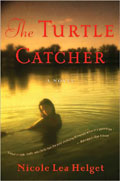 978-0547248004 – Mariner Books – paperback – $13.95 (also available as an e-book)
978-0547248004 – Mariner Books – paperback – $13.95 (also available as an e-book)
I found this book, written by an author I had never heard of before, by doing something very old fashioned: browsing in a bookstore. There are many forms of discovery, but finding a book you want to read in a store is still a great pleasure. And when you take it home and start reading it, and find out you made a lucky choice to read an exceptionally fine novel, that is a true and deeply rewarding experience.
I was surprised to learn that The Turtle Catcher is Nicole Helget’s first novel – she doesn’t write like a first novelist at all. The opening of this novel is absolutely perfect, and is beautifully written, setting the tone for a complicated, very often painful, but also engrossing story. Helget’s novel is mystical and magical, but these moments of “magical realism” where she enters another plane counterpoint brilliantly with the almost plainspoken story she has to tell about immigrant families in a German-American community in rural Minnesota in the early 20th century. The book is set in the now little discussed period just before, during and after World War I, a time that was very complicated for communities of recently arrived immigrants from the old country, with Germany now the enemy of their new homeland. The tensions within the town provide a taut backdrop for Helget’s for the focus of her story.
The author weaves together the lives of two families living on adjoining farms in the small town of New Germany, Minnesota. Liesel Richter and Lester Sutter are at the core of the book, along with their fathers and deeply suffering mothers, and what happens to Lester, told brilliantly and painfully in the opening scene of the book is the capstone to a long, rich story of families and communities, hidden wounds and deep suffering transformed into a kind of stoic transcendence Helget’s characters embrace, almost because it is all they are capable of doing in the face of such pain.
In The Turtle Catcher, Nicole Helget has created a multi-layered family story whose characters inhabit (and illustrate for readers) a specific place and time, but as with all great novels, through their story, they are transformed into something deeply moving and powerful. I really loved this novel, and will read it again, I am sure.
I wanted to talk to Nicole about the emotional content of the book, how she came to create this novel (it started with a short story), and discuss some of the complexities of her really wonderfully drawn characters. I think we succeeded in exploring this writer’s work in a really interesting conversation I hope will encourage readers to seek this novel out and read it for themselves. I do think Nicole Helget is a terrific writer, someone whose work I am deeply gratified to have discovered.
Podcast: Play in new window | Download
Publishing Talks: David Wilk interviews Peter Brantley
September 12, 2010 by David
Filed under Ebooks and Digital Publishing, PublishingTalks, The Future
 In this series of interviews, called Publishing Talks, I have been talking to book industry professionals and other smart people about the future of publishing, books, and culture. This is a period of disruption and change for all media businesses. We must wonder now, how will publishing evolve as our culture is affected by technology, climate change, population density, and the ebb and flow of civilization and economics?
In this series of interviews, called Publishing Talks, I have been talking to book industry professionals and other smart people about the future of publishing, books, and culture. This is a period of disruption and change for all media businesses. We must wonder now, how will publishing evolve as our culture is affected by technology, climate change, population density, and the ebb and flow of civilization and economics?
I hope these Publishing Talks conversations will help us understand the outlines of what is happening, and how we might ourselves interact with and influence the future of publishing as it unfolds.
These interviews give people in and around the book business a chance to talk openly about ideas and concerns that are often only talked about “around the water cooler,” at industry conventions and events, and in emails between friends and they give people inside and outside the book industry a chance to hear first hand some of the most interesting and challenging thoughts, ideas and concepts being discussed by people in the book business.
Peter Brantley is the Director of the Bookserver Project at the (totally cool) Internet Archive, a San Francisco-based not for profit library. He contributes regularly to several blogs on libraries and publishing, discussing transformations in media and information access. He serves on the board of the International Digital Publishing Forum, the standards setting body for digital books. Peter has significant experience with academic research libraries and digital library development programs, and was previously the Executive Director of the Digital Library Federation, a not for profit membership organization of research and national libraries.
As Peter pointed out to me recently, the word “rant” is a part of his name. So we could expect him to have something interesting to say about almost any subject related to books and the digital landscape. I think that comes across well in our talk. He brings to bear his experience as a librarian but also has a broad perspective on many subjects simply because he pays attention to so many ideas and developments across a wide spectrum of subject areas and interest groups. We had a lot of fun talking together, and hope listeners will enjoy our talk as well.
I am happy to say that this is the 100th post on Writerscast, a milestone of sorts, I suppose.
Podcast: Play in new window | Download
Avery Aames: The Long Quiche Goodbye
September 5, 2010 by David
Filed under Fiction, WritersCast
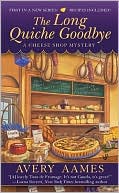 978-0425235522 – Berkley – Mass Market Paperback Original – $7.99 (also available as an ebook 978-1101188644 at $6.99)
978-0425235522 – Berkley – Mass Market Paperback Original – $7.99 (also available as an ebook 978-1101188644 at $6.99)
I don’t often read mysteries, but a few weeks ago, right in the middle of summer, the season for entertaining novels (often known as “beach reads”) I decided to give this novel a try. The tongue-in-cheek title first caught my attention, and I really liked the unusual setting for the novel (small town Ohio) and the quirky but very believable cast of characters. So The Long Quiche Goodbye is definitely a fun read but not just a throwaway summer book. Avery Aames is a good writer and she has deft with her creation and handling of characters.
As I mentioned, I am not a steady reader of mysteries, so I may not be as experienced as some are with the various forms and formats of mysteries – they do fall into a set of recognizable patterns, I know. In The Long Quiche Goodbye, our main character is Charlotte Bessette, the proprietor of the family owned cheese shop called Fromagerie Bessette, in the small town of Providence, Ohio. At the gala re-opening of the store after a full scale renovation and modernization, the store’s landlord (whom we already know not to like) is found stabbed to death with one of the store’s knives, and Charlotte’s grandmother is the prime suspect.
We’re off from there, with a full cast of local characters, friends, family, police, and a couple of other prime suspects in town to make things interesting. And it’s Charlotte who takes the lead in finding out who the real killer must be, as clearly, she feels (and we come to feel as well) that it could not have been her wonderful grandmother (who is the Mayor of the town!)
Avery Aames had a lot of fun writing The Long Quiche Goodbye, I think, and her pleasure and involvement with her characters comes across in the way she writes their story. I also had a great time talking to her about this well written book, her work as a writer, and the next books in the series that this book inaugurates. It looks like this series will be successful, and deservedly so – this first in the “Cheese Shop Mysteries” is already a national bestselling mystery novel. You can visit Avery’s website to learn more.
Podcast: Play in new window | Download
Kamran Pasha: Shadow of the Swords
August 28, 2010 by David
Filed under Fiction, WritersCast
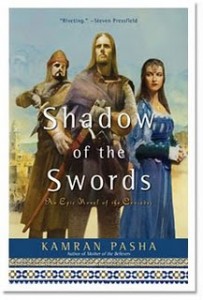 978-1416579953 – Washington Square Press – Paperback Original – $16.00 (e-book edition $9.99)
978-1416579953 – Washington Square Press – Paperback Original – $16.00 (e-book edition $9.99)
I love reading really good historical novels. I’m actually not sure how I found out about this book, but I knew I wanted to read it when I learned that the author, Kamran Pasha, is a Muslim writing about the Third Crusade from a Muslim perspective. That’s definitely a fresh concept. It turns out that Pasha is a terrific writer, and a deft story teller.
It’s almost impossible for Western readers not to think about the Crusades from the Christian side. The Third Crusade, headed by Richard the Lion-Heart, is one of the best known stories ever told, and our knowledge and understanding of the great Muslim ruler Saladin is without doubt cast by the Western version of the story. In Shadow of the Swords, we see things very differently, and not just the Muslim side, there are intriguing Jewish and female characters who are integral to the storyline in many fascinating ways.
Some of the characters and events in this book are based in reality, others are made up, but they are always consistent and believable. By inserting the fictional Miriam, daughter of the historical Maimonides into the story of Richard and Saladin, Pasha is able to link their personae and the real historical events of the battles between them into a much more personal context, which helps bring these complicated characters to life. We realize as the story unfolds that through their opposition, the two main characters will come to know, understand, and appreciate the other, both literally and figuratively. Which is a lesson our modern society could stand to learn too.
Kamran Pasha is a prolific writer. He has created novels (his first book was Mother of the Believers, another historical novel), television (Kings), video games (Blood on the Sand), and is now currently working on a theatrical film as well. He came to writing through an interesting career – he holds a JD from Cornell Law School, an MBA from Dartmouth and an MFA from UCLA Film School. He spent three years as a journalist in New York City before he went to Hollywood to become a full time creative writer.
I really enjoyed reading this book, and talking to Kamran Pasha was a terrific experience I hope you will also enjoy. And do enjoy this serious, well written and very compelling novel. It’s literate, well written and packed with interesting ideas that lives up to its billing as an “epic novel.” Pasha blogs passionately about many current issues at his own website, well worth a visit.
Podcast: Play in new window | Download
Dale Pendell: The Great Bay: Chronicles of the Collapse
August 21, 2010 by David
Filed under Fiction, WritersCast
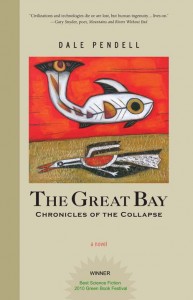 978-1556438950 – North Atlantic Books – Hardcover – $21.95
978-1556438950 – North Atlantic Books – Hardcover – $21.95
This is an amazing novel. Consider it a work of “ecological science fiction” as some have called it. I found it captivating, terrifying, incredibly emotive and reading it becomes almost a spiritual exercise. Pendell posits a worldwide collapse of population from a biological war gone amok. More than 95% of humanity disappears, almost overnight. He actually does not spend much time on this part of the story, horrific as it is, because that catastrophe is really just the lead in for the much bigger story of what happens next.
Aside from the critical principle of understanding, that modern human society will simply collapse, that going back to prior technologies becomes impossible because people no longer have the knowledge or skills, to live the way our ancestors did, and critically, cannot relearn them overnight in the face of societal collapse, the central tenet of this novel is that climate change will have been unleashed by what modern society *has already done* to the natural world. The computer models of planetary climate change are simply not able to fully contain and predict the massiveness of what is about to happen to the planet and the natural world that inhabits it.
The novel is essentially a brilliant imagining of what might or could be the future of the planet over the next hundreds, thousands of years, based on the supposition that humans have already begun this process of change. It’s a rich set of interlocking stories, mostly focused on the area that is known today as California, a bio-geographic landscape that author Pendell knows well, and imagines changing in profound and sometimes painful ways for the reader of his story.
This is a very unusual novel – really the main character is the planet and there are no traditional heroic human characters at its center. While we might search for and find labels for it (“dystopian” or “utopian,” “science fiction” or even “parable”), I’d rather think of it as a kind of vision-telling, a myth in the making, that seeks to change the way we think about ourselves. Indeed, there is a great deal of suffering and difficulty in the book, and at the same time, a powerful sense of continuity, what truly sustains. As the great poet Gary Snyder (who is a fictionalized character in the book, as it happens), says about the novel: “Civilizations and technologies die or are lost, but human ingenuity–families, tribes, and villages, the musicians, shamans, philosophers, and people of power–live on.” I’d add that not only does human ingenuity live on, so does Gaia, our planet home, adjusting and re-adjusting its inner and outer being, regardless of which or how many humans may be hanging on for dear life.
In my conversation with Dale, we talked about his background as a writer, poet, biologist, and how this brilliant vision of a book came into being. It’s an interview and a book I’d recommend to all my friends and colleagues – it’s impossible to read and not do alot of thinking about the future, as well as what we need to do about it – right now.
Podcast: Play in new window | Download
Publishing Talks: David Wilk interviews Deborah Emin
August 16, 2010 by David
Filed under Ebooks and Digital Publishing, PublishingTalks, The Future
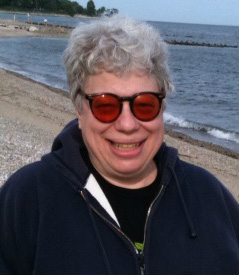 In this series of interviews, called Publishing Talks, I have been talking to book industry professionals about the future of publishing, books, and culture. This is a period of disruption and change for all media businesses. How will publishing evolve as our culture is affected by technology, climate change, population density, and the ebb and flow of civilization and its economics?
In this series of interviews, called Publishing Talks, I have been talking to book industry professionals about the future of publishing, books, and culture. This is a period of disruption and change for all media businesses. How will publishing evolve as our culture is affected by technology, climate change, population density, and the ebb and flow of civilization and its economics?
I hope these Publishing Talks conversations will help us understand the outlines of what is happening, and how we might ourselves interact with and influence the future of publishing as it unfolds.
These interviews give people in the book business a chance to talk openly about ideas and concerns that are often only talked about “around the water cooler,” at industry conventions and events, and in emails between friends and they give people inside and outside the book industry a chance to hear first hand some of the most interesting and challenging thoughts, ideas and concepts being discussed by people in the book business.
I learned about Deborah Emin from an article about Sullivan Street Press and her “throwback” program called the Itinerant Book Show. Deborah and colleagues (they call themselves “bookies”) travel to towns in the midwest as far as Iowa bringing books they select to events in art galleries, bars, coffee shops and the like. Because they are featuring only books they have read and liked, it’s pretty easy to understand how they are connecting successfully with audiences. And as she points out on the Sullivan Street website, the real key is what Deborah as a publisher and writer can learn about audiences. Face to face, one to one. It’s invaluable intelligence for anyone concerned with understanding how a literary community works.
All of this resonates for me. Her story reminded me of work some of us were doing more than thirty years ago, bringing books by new authors and publishers to booksellers and audiences around the country. In the late 1970’s what was then called the Coordinating Council of Literary Magazines (still going strong and known as CLMP) sponsored a number of grassroots efforts to bring independently published poets and writers into bookstores, which involved personal visits to bookstores, libraries, schools and even bars to sell books.
There were programs in North Dakota (where a budding young writer named Louise Erdrich interned), Rochester, NY, Minneapolis-St. Paul (where I was) and other locales, all sharing a commitment to connecting innovative new writers to new audiences, sometimes, one person at a time. Many then young publishers still publishing today, were introduced to their audiences through those early efforts.
So is everything old new again? I think the spirit of independent publishing continues. Writers find their readers, and readers their books one at a time, after all. The magic of literary discovery still requires the kind of personal effort that Deborah Emin and the Itinerant Book Show put forth. Which is also the kind of personal connection forged by booksellers with their customers. Whether the books are printed by hand on custom paper using handpresses, or created digitally using HTML or ePub, learning about a book you will love is ultimately about a deep connection between the writer, and the reader, with one or more intermediaries making the hand off.
Sullivan Street Press consists of Deborah Emin, an editor and writer, Ron Lebow, a computer technologist, a business development professional and also a writer. It’s a pretty interesting and obviously fertile group of minds and talents. The work they are doing is challenging and rewarding, and offers valuable lessons for publishers of any size and ambition.
Podcast: Play in new window | Download
Gayle Brandeis reading from “Delta Girls”
August 15, 2010 by David
Filed under AuthorsVoices
978-0345492623 – Ballantine – Paperback – $15.00 (also available as an e-book at $9.99)
Writerscast is proud to present the third in a series of authors reading from their work, called AuthorsVoices. I hope you will agree that hearing these works read aloud by the original authors adds to your experience of the writing.
I love getting a sense of the author’s distinct sense of her or his own words. With writers touring in support of their books less frequently now, these podcasts should provide readers with an opportunity to hear some of our best contemporary authors reading from, and sometimes performing their own works.
Gayle Brandeis’ Delta Girls was a great discovery for me. I loved her writing, her characters, and the pace and flow of the novel. I particularly enjoyed the way Gayle set up the alternating stories of the two women, Izzy and Karen and of course brought them together with what was for me a very surprising climax to the story. In this reading from the novel, Gayle reads the opening two chapters, where the two characters are introduced and their ultimately intertwining stories begin.
Gayle has a terrific website where you can learn more about her and her work. Her’s her brief bio as a writer:
Gayle Brandeis grew up in the Chicago area and has been writing poems and stories since she was four years old. She is the author of Fruitflesh: Seeds of Inspiration for Women Who Write (HarperOne), Dictionary Poems (Pudding House Publications), the novels The Book of Dead Birds (HarperCollins), which won Barbara Kingsolver’s Bellwether Prize for Fiction in Support of a Literature of Social Change, Self Storage (Ballantine) and Delta Girls (Ballantine), and her first novel for young readers, My Life with the Lincolns (Holt). It’s great hearing her own voice here speaking the words she has written.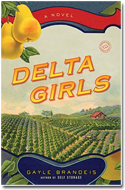
Podcast: Play in new window | Download
Gayle Brandeis: Delta Girls
August 10, 2010 by David
Filed under Fiction, WritersCast
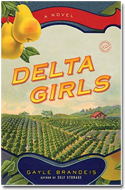 978-0345492623 – Ballantine – Paperback – $15.00 (also available as an e-book at $9.99)
978-0345492623 – Ballantine – Paperback – $15.00 (also available as an e-book at $9.99)
I think I have been lucky lately – I keep finding new novelists I have never heard of before, whose work turns out to be really good. Literary discovery is very exciting. Gayle Brandeis is one of those novelists whose work is completely new to me. Delta Girls is her third novel for adults, and she has one other for young adults. Her social awareness as a writer has been recognized for a previous novel (that I now want to read) called The Book of Dead Birds – it won Barbara Kingsolver’s Bellwether Prize for Fiction in Support of a Literature of Social Change, which I consider high praise indeed. One of Gayle’s great accomplishments in Delta Girls is to include a strong undercurrent of social awareness in a way that enhances the story and does not in any way intrude on one’s enjoyment of the novel and its characters.
Delta Girls is a terrific novel (great cover too, and yes, I do think the overall book package does contribute to the experience for the reader). Its construct is unusual – each chapter is the alternating story of two characters whose relationship is not divulged until nearly the end of the book. First is Izzy, who with her nine year old daughter Quinn, is constantly on the move as an itinerant fruit picker in California. As the story opens, they arrive at a pear orchard in the Sacramento River Delta. As with all her stops, Izzy has no intention of staying very long. But the orchard, its locale, and the family that owns it has a strong attraction for both Izzy and Quinn, and they both allow themselves to become involved and attached to the orchard and its people. We know that Izzy has a secret in her past, and that she has worked hard to stay away from the public eye, but events occur that put her in the middle of developments in the Delta and she will have to risk everything to save the ones she loves.
In the alternating narrative of the book, we meet Karen, a rising young star in figure skating with a pushy mother and a powerful and attractive new skating partner. Nathan is sexy, dangerous, and deeply attractive to Karen. As she reaches her 18th birthday, events come to a head in an unexpected and very public way.
Each main character is faced with a sudden thrust into the spotlight, and of course their narratives become more connected — but you will need to read the book to find out the surprising way their lives will intersect.
This is a very satisfying novel to read, with great characters, and of course the pear orchard and the Delta of the Sacramento River is a terrific backdrop for the book. The author’s deep love for her characters as well as her understanding of the power of place, and its influence on people’s lives show constantly throughout the novel.
Gayle is a thoughtful and accomplished writer whose work I am really pleased to have discovered. It is writing I want to explore more deeply. Talking to her about this book was a pleasure I am happy to share here. You can visit Gayle’s website here to learn more about her work.
Podcast: Play in new window | Download
Justin Kramon: Finny (A Novel)
August 5, 2010 by David
Filed under Fiction, WritersCast
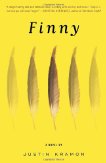 978-0812980233 – Random House – Paperback – $15.00 (also available as an ebook at $9.99 or less)
978-0812980233 – Random House – Paperback – $15.00 (also available as an ebook at $9.99 or less)
Finny is a wonderful first novel, a coming of age novel (and more), at the center of which is a wonderful character – Delphine “Finny” Short of course. This is Justin Kramon’s first novel, and he is a very good writer. He’s been writing and publishing short stories up to now, in literary magazines like Glimmer Train, TriQuarterly and elsewhere, but I think his future lies in the longer form a novel affords.
This novel begins when Finny is 14, and continues on through many more years of her life, with many adventures, and a large cast of really well drawn characters. Many reviewers have mentioned Dickens as a comparative, and that is apt, as Justin himself makes clear that the Dickensian model was on his mind when he was writing this book. He does very well with the large story arc, which gives the author enough room to really explore the inner life of his major characters.
Life is complicated, relationships that seem to have promise fall apart, and sometimes we have to deal with surprises in the way things actually work out. As Finny says herself about life, it is “hilariously funny and devastatingly sad. And only if you saw both things could you ever have a realistic idea of the subject.’’ It’s hard not to agree with the author and his character on this point, especially after spending time with Finny and her life story.
So even though there’s much in Finny’s life that is difficult, sad or disappointing, in both family relationships, love life and friendships, overall, her character comes through as positive about life and how she has lived it, somewhat idiosyncratically, and with a good bit of humor. That’s probably true of the author as well, and it’s a compelling journey for the reader. There’s a lot of richness here, and a thoroughly enjoyable novel it is.
I also enjoyed talking to Justin about his book, its characters, how he came to write this novel, his work as a writer and where he is going in the future. He’s got a really good sense of himself as a writer,an engaging personality, and a fine command of his craft at this early stage of his career. I think there’s much more good work to come from this novelist, work I will certainly be looking forward to reading.
I do also want to mention Justin’s website, which is one of the better author or book sites I have seen lately. There’s alot of fun stuff there, especially fun is the section called “Finny’s World” where the characters in the novel are drawn as imagined by artist David Ostow. It’s definitely worth a visit.
Podcast: Play in new window | Download

